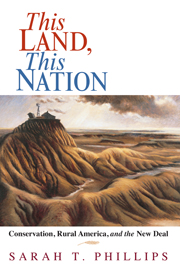1 - The New Conservation
Published online by Cambridge University Press: 05 June 2012
Summary
On a June afternoon in 1931, Franklin D. Roosevelt addressed his fellow governors assembled in Indiana for their annual conference. The severe economic situation, he said, called for positive leadership, tangible experiments, and government guidance. Yet Roosevelt confined his remarks that day to one particular aspect of the nation's troubles – the “dislocation of a proper balance between urban and rural life.” Describing how hundreds of farmers clung to exhausted lands and eked out an existence far below the “American standard of living,” he outlined measures New York State had initiated to classify lands, relieve tax burdens, purchase and reforest submarginal farmland, and bring cheaper electricity to the agricultural areas. He looked forward to a time when farmers cultivating land too worn to yield a profit would find alternate employment in factories close to rural communities. Planning for “a permanent agriculture,” Roosevelt explained, was the state's ultimate purpose.
Roosevelt's calls for “a proper balance” and “a permanent agriculture” encapsulated a new style of conservationist thinking, one largely developed in the decade before the New Deal. Conservationists in the Progressive era had essentially confined their efforts to waterways, forests, and recreational lands, and they advocated public ownership (mostly in the sparsely settled West) as the primary remedy for individual and corporate misuse. While the Progressives failed to win provisions for national, multiple-purpose river basin planning after World War I, the movement continued to influence natural resource policy during the 1920s.
- Type
- Chapter
- Information
- This Land, This NationConservation, Rural America, and the New Deal, pp. 21 - 74Publisher: Cambridge University PressPrint publication year: 2007



